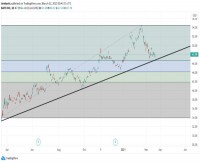|
Opalesque Industry Update - Institutional investors say world political and economic events could push the level of market volatility higher in 2017, finds a study by Natixis Global Asset Management. As a result, they plan to reset their portfolios, relying on active management and alternative assets as they seek to manage risk and boost returns. Natixis surveyed decision makers at 500 institutional investment firms around the world on their market outlook and asset allocation plans for 2017 and beyond. Volatility topped the list of concerns for 2017, with 65% pointing to geopolitical events, 38% citing the U.S. elections, and 37% noting the potential for changing interest rate policies. “Unprecedented economic and political forces around the world are the top concern for institutions in 2017,” said John Hailer, CEO of Natixis Global Asset Management for the Americas and Asia and Head of Global Distribution. “In volatile markets, institutions are looking to active management to strengthen returns and manage risk.” Pros Choose Active Management Over Passive Especially in anticipation of higher volatility, institutional investors favor active management over passive. They also express concern over the market distortions caused by passive investing:
- 73% say the current market environment is likely favorable to active management Over the longer-term, institutions project they will use passive investments less than they previously believed. They say 67% of their assets are actively managed and 33% are in index-tracking investments, and they expect the share of passive investments to rise only one percentage point, to 34%, in the next three years. In a 2015 Natixis survey, investors expected 43% of assets would be passively managed within three years. The main reason for using passive strategies, cited by 88% of respondents, is a desire to manage fees, but 57% said the prevalence of “closet indexers” – managers who charge higher active fees for index-like strategies that closely hug their benchmark – as another reason. Three-quarters (75%) of these professional investors say that individual investors are unaware of the risks of passive strategies and have a false sense of security about their use. Move to alternatives tops asset allocation trends Half (50%) of surveyed institutional decision-makers across the globe plan to increase their use of alternative strategies in 2017, with two-thirds (67%) using them for diversification and a third (31%) for risk mitigation. Emerging market equities, high yield fixed income and financials are other big winners. The survey found:
Use of alternatives rises: Institutional investors will shift more toward alternative investments in 2017, raising their allocations to 22% from 18% of assets. They will increase equity allocations slightly, to 36% from 34%, and dial back on fixed income, to 32% from 35%. U.S. Presidential Impact The responses also showed that institutional investors’ confidence suffered after the U.S. election. Natixis conducted the survey in two stages, with 340 investors polled just before the U.S. presidential election on Nov. 8 and 160 responses collected just afterward. Prior to the election, two-thirds of respondents expressed confidence in their organization’s ability to handle the risks associated with investment performance, which fell to only 53% among those surveyed after the election. The outlook for U.S. and emerging market stocks also changed substantially after the election. Forty-three percent (43%) of investors surveyed before the election said emerging markets would be the best-performing equity market in 2017 compared to 31% of those surveyed after the election. Meanwhile 46% of those surveyed before the election said the U.S. would be the biggest disappointment among global stock markets, compared with 31% of those surveyed afterward. The proportion of investors who said longer-term government bonds would be the most disappointing fixed income asset class in 2017 rose from 63% before the election to 76% afterward. Methodology Natixis surveyed 500 institutional investors about their opinions on risk, predictions on asset allocation, and views on market performance. The respondents included managers of corporate and public pension funds, foundations, endowments, insurance funds and sovereign wealth funds in North America, Latin America, the United Kingdom, Continental Europe, Asia and the Middle East. Data was gathered in October and November 2016 by the research firm CoreData. The findings are published in a new whitepaper, “Buckle up, it’s going to be a bumpy ride.” For more information, visit https://ngam.natixis.com/us/research/institutional-survey-outlook-2016 Natixis is ranked among the world’s largest asset management firms. Uniting over 20 specialized investment managers globally ($897 billion AUM), we bring a diverse range of solutions tailored to meet every strategic challenge. Bg Article source - Opalesque is not responsible for the content of external internet sites |
Industry Updates
Investors expect higher volatility in 2017, plan to increase use of alternative strategies
Wednesday, December 14, 2016
|
|





 RSS
RSS







